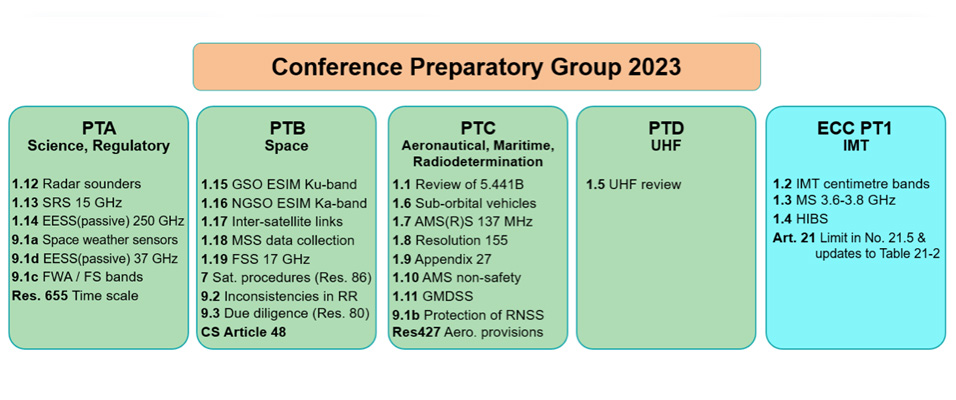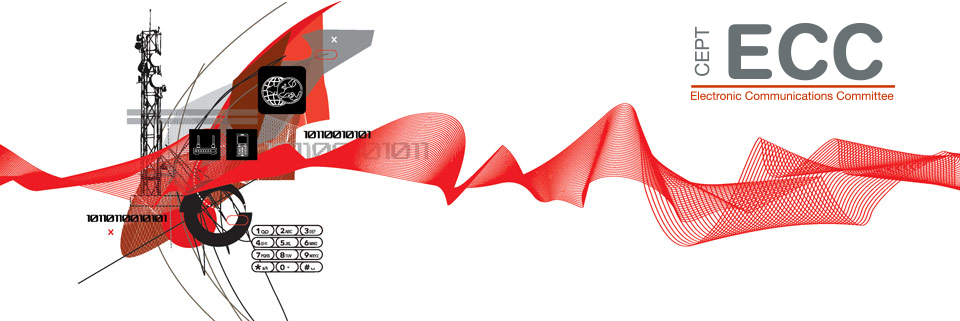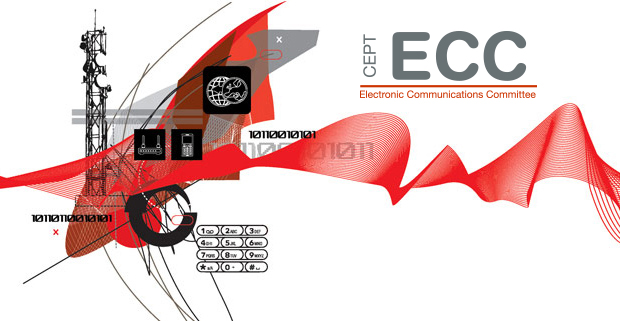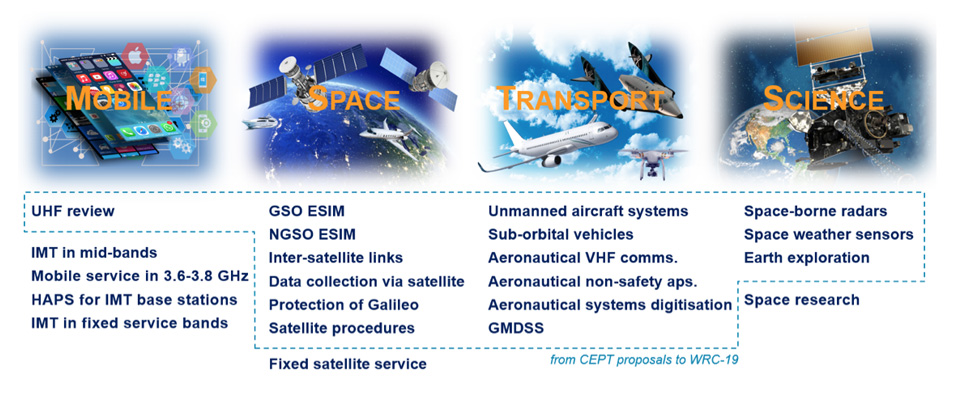CEPT begins the build-up to the 2023 World Radiocommunication Conference
Preparation is key ahead of the next World Radicommunication Conference where administrators from across the globe will make hugely impactful decisions on the future of spectrum management.
The next World Radiocommunication Conference (WRC-23) will once again bring together thousands of spectrum and satellite orbit administrators. Their decisions will affect not just the entire information and communication sector but millions of people across the globe
Any outcomes arising from WRC-23 will need to ensure that society benefits and takes full advantage of both existing and upcoming technological innovations without disrupting the radiocommunications services currently provided to people worldwide. The quality of these decisions will depend on the quality of the studies conducted in the preparatory period before the conference.
WRC-23 agenda from the CEPT perspective
The agenda of the next conference has been compiled to a large extent following proposals from CEPT. In particular, 13 of 19 agenda items originate fully or partially from European Common Proposals to WRC-19. Therefore, many agenda items for WRC-23 are significant for CEPT.
Generally speaking, the whole agenda of WRC-23 falls broadly into four categories of issues: mobile broadband, satellite, transport and science.
It has become a tradition that the conferences deal with mobile broadband questions; the next conference is not an exception. However, except for the issue of UHF review, none of the questions in the mobile chapter of the conference have been suggested by CEPT. Nonetheless, CEPT will need to deal with agenda items on mobile thoroughly, especially because some bands in the middle frequency range are suggested for International Mobile Telecommunications (IMT) identification only in Region 1.
Another broad category of agenda items deals with satellite questions. Some of these aim to enhance the usage of existing satellite spectrum allocations, while others look for more spectrum for satellites. CEPT will certainly contribute to the related studies as all but one of these agenda items will come from European proposals to the conference. For example, when it comes to earth stations on aircraft and vessels communicating with geostationary space stations in the Ku-band, CEPT will seek that European harmonisation is extended at global level – we already have the corresponding ECC Decision (19)04. The same aspiration regards non-geostationary fixed-satellite service earth stations in motion in the Ka-band. Here, CEPT will work to mirror globally the requirements provided in ECC Decision (15)04. One cannot but mention also the protection of Galileo, the European global navigation satellite system, from amateur emissions in the 1240-1300 MHz range.
A number of items on the agenda of WRC-23 deal with aeronautical and maritime services, which can be designated as transport issues. On some of these agenda items CEPT has common interests with other regional organisations. An example is the usage of unmanned aircraft systems, where the technical and regulatory requirements are important for safety-of-flight operation. Some other agenda items on the transport chapter of the conference, including non-safety aeronautical applications, started out as purely CEPT proposals but have gained support from other regional organisations.
The fourth group of agenda items deals with science issues. CEPT is interested in, and supportive of, studies into the appropriate recognition of space weather sensors in the Radio Regulations. Furthermore, the identification of an appropriate regulatory solution for the agenda item on the Earth Exploration Satellite Service (passive) allocations around 250 GHz would be an important contribution to the Ice Cloud Imaging mission of EUMETSAT, the European Organisation for the Exploitation of Meteorological Satellites.
Tackling the issues at WRC-23
Of the many issues to be discussed at WRC-23, two are likely to be highly contentious and time-consuming.
Agenda item 1.5 calls for a review in Region 1 of the spectrum use and spectrum needs primarily of broadcasting and mobile services within the UHF frequency band 470-960 MHz. In fact, since WRC-2000, every second conference has taken a part of the UHF band and identified it for IMT: the so-called 900 MHz band in 2000, the 800 MHz band in 2007 and the 700 MHz band in 2015. One may recall the intense debates at WRC-15 following the proposal from some countries to identify the band below 694 MHz for IMT. On that occasion the conference took the wise decision to postpone the related discussion and resolution until 2023.
Unquestionably, a lot is at stake under this agenda item, especially for the broadcasting community – the terrestrial delivery of audio-visual content is still an important platform across the globe and in many European countries in particular. Nevertheless, if we find the way for real practical coexistence between broadcasting and mobile services, the discussions at the conference should converge quicker to a decision. In this respect, we may refer to and leverage the studies conducted by the ECC Task Group 6 and documented in ECC Report 224. Those studies revealed the feasibility of coexistence between broadcasting and mobile downlink networks and could be a starting point for this agenda item.
Another prominent issue at the next conference will be agenda item 1.2, which looks for IMT identification in certain bands of the middle frequency range. As far as Europe is concerned, the band 6425-7025 MHz, also referred as the C-band, is the focus. Different aspects will need to be considered and resolved in order to ease discussions at the conference.
First, the protection of existing services, including the fixed and fixed-satellite services, should be studied. Noting that the co-existence between fixed and mobile services is primarily a national issue, the main effort must be focused on ensuring protection of the fixed-satellite service. Conceptually, the compatibility between IMT and the fixed-satellite service was already studied ahead of WRC-15 under agenda item 1.1 – it considered possible additional IMT identification in several bands. Those studies showed that sharing with C-band, fixed-satellite services would impose additional requirements on IMT stations – such as restricting IMT deployment to indoor and limiting the maximum emitted power of IMT base stations. However, IMT technology has advanced since 2015 and further mitigation improvements might be expected.
Another important element which puts an additional complexity to the studies is that the band 6725-7025 MHz serves for the uplink fixed-satellite service transmissions in Appendix 30B of the Radio Regulations. So, one would touch the planned satellite bands, which has always been a delicate issue in ITU Radiocommunication Sector (ITU-R). It is also necessary to mention the technology competition for the use of the band between IMT and wireless access systems, including radio local area networks. They would certainly add indirectly a further political flavour into the discussions under this agenda item.
The ECC prepares for WRC-23
The ECC Conference Preparatory Group (CPG) has made a successful start to CEPT preparations for WRC-23, making full use of the electronic working arrangements developed by the ECC. In particular, due to the COVID-19 pandemic and the inability to hold a physical meeting, the group worked by correspondence using the ECO Forum facilities and organised its first meeting remotely on 22 and 23 June 2020.
The preparation of European Common Proposals for WRC-23 will be piloted in five project teams under the guidance of CPG. The assignment of conference agenda items to the different project teams takes account of the allocation of the ITU-R preparatory work. It also ensures the workload balance between different groups, thus easing an efficient participation of the membership to CEPT´s studies.
 The CPG management team will pursue transparency in the whole preparatory process, to facilitate and encourage contributions from the membership. In this respect and following the consolidated ECC tradition, CPG activities are open to all concerned stakeholders willing and able to contribute to the relevant studies.
The CPG management team will pursue transparency in the whole preparatory process, to facilitate and encourage contributions from the membership. In this respect and following the consolidated ECC tradition, CPG activities are open to all concerned stakeholders willing and able to contribute to the relevant studies.
It should also be recognised that different interests and needs exist across regional organisations in all three ITU-R regions. Therefore, CPG has already started and will maintain the dialogue and cooperation with these organisations throughout the whole study period in order to achieve the ultimate goal of a successful WRC-23.
Alexandre Kholod
Chairman, ECC Conference Preparatory Group




